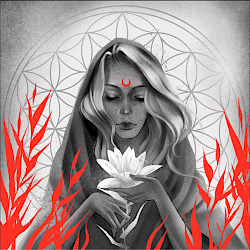
Release of the new work "White Lily"
Yulia Samoilova: "Healthy bully!" Why did the Russian singer sing in Ukrainian?
 Formally, Yulia Samoilova is a participant in two Eurovision contests in a row. However, one of them did not take place for her in reality. As you know, the host country - Ukraine - banned the singer from entering its territory for a number of reasons. It would seem that the artist should have been forever offended by the country, but for several years, on the contrary, she spoke very friendly about her audience in Nezalezhnaya. And the first single this year sounds half in Ukrainian.
Formally, Yulia Samoilova is a participant in two Eurovision contests in a row. However, one of them did not take place for her in reality. As you know, the host country - Ukraine - banned the singer from entering its territory for a number of reasons. It would seem that the artist should have been forever offended by the country, but for several years, on the contrary, she spoke very friendly about her audience in Nezalezhnaya. And the first single this year sounds half in Ukrainian.
"White Lily" is the first release of the post-view period. Agree, the past year turned out to be difficult for all artists and spectators without exception. During the period of the epidemic, we, one way or another, reassessed our priorities in life. Something finally turned out to be meaningless and faded into oblivion. Something has captured the pinnacle of our attention. The awareness of the value of the family remained unchanged and even strengthened.
- "Mom" in all languages of the world, approximately, sounds the same, - notes Yulia Samoilova. - The symbolism of the "White Lily" is precisely in the flashback to childhood, during that warm, carefree time when my mother sang a lullaby quietly. Probably, everyone in anxious moments wants to at least mentally transfer there, - says the singer.
 "White Lily" is an authentic trip-hop sound intertwined with explosive arpeggios in the best traditions of mid tempo and ethnicity. Deep shamanic rhythms really take the listener to the origins of Slavic life. The author of the poems is Yulia Samoilova herself. And she does not deny the deliberate exaggeration of the usual lullaby. This is her personal perception of a carefree childhood. “In my little sleep, it seemed to me something mystical. As I understand now, our lullabies are both a song and a prayer that originated during paganism, then from mouth to mouth, from generation to generation, these midnight tunes have come down to us. This is my response lullaby for mothers, ”says Yulia Samoilova.
"White Lily" is an authentic trip-hop sound intertwined with explosive arpeggios in the best traditions of mid tempo and ethnicity. Deep shamanic rhythms really take the listener to the origins of Slavic life. The author of the poems is Yulia Samoilova herself. And she does not deny the deliberate exaggeration of the usual lullaby. This is her personal perception of a carefree childhood. “In my little sleep, it seemed to me something mystical. As I understand now, our lullabies are both a song and a prayer that originated during paganism, then from mouth to mouth, from generation to generation, these midnight tunes have come down to us. This is my response lullaby for mothers, ”says Yulia Samoilova.
Thousands of Ukrainians and Russians who know the Ukrainian language responded to help in translating the text. The combination of the two languages in the single really gave a special semantics to the text and emphasized the melodic arrangement. In the words of critics, there is a certain connection between generations. After all, it is the Ukrainian and Belarusian languages that are closest to the original Slavic dialect.
Thus, time passes, generations replace each other, languages divide people into countries. But lullabies remain unchanged, like the word "mom", they all sound peaceful too.
You can listen to the song on your platform HERE

